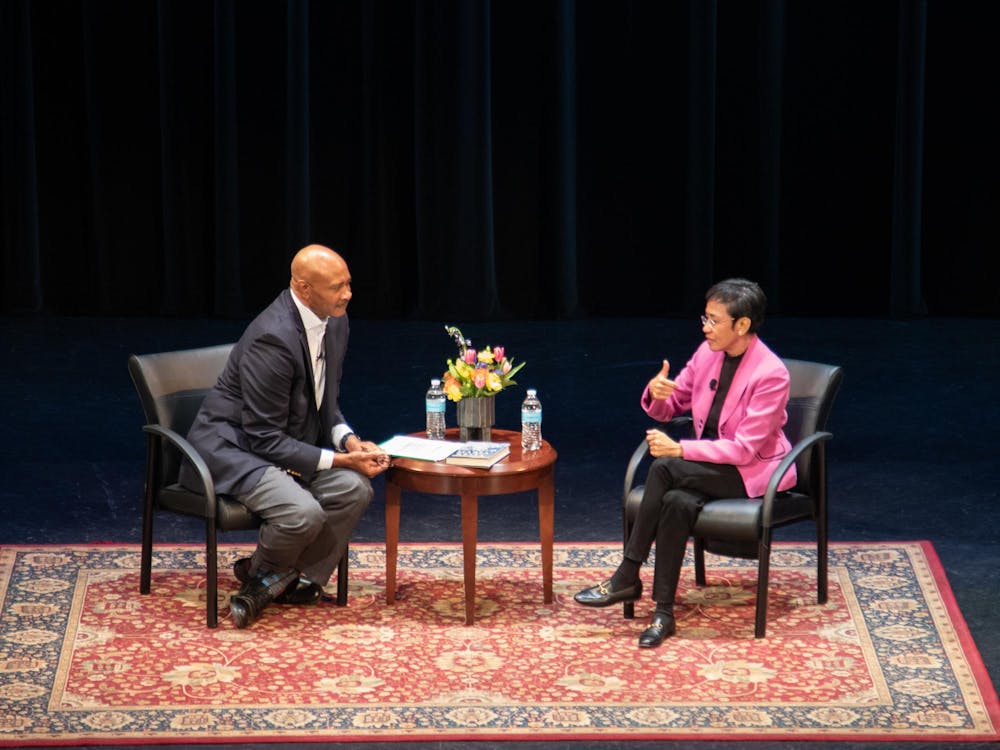Maria Ressa, a Nobel Peace Prize laureate and Filipino-American journalist, spoke about her experiences in journalism, the influence of technology and social media and her perspective on the future of journalism at a Rubenstein Distinguished Lecture Thursday evening.
The event was sponsored by the Sanford School of Public Policy, the Dewitt Wallace Center for Media and Democracy, the Duke Program in American Grand Strategy and the Duke Centennial. Stephen Buckley, Eugene C. Patterson professor of the practice of journalism and public policy, joined Ressa onstage in Page Auditorium for the conversation.
Ressa currently serves as CEO of Rappler, a Filipino online news site she co-founded in 2012. She previously worked at CNN as a lead investigative reporter for 18 years before returning to the Philippines to “cover the transition of Southeast Asia from authoritarian one-man rule to the pendulum swinging toward democracy.”
Ressa and her co-founders used their platform to publicize the extensive corruption of former president of the Philippines Rodrigo Duterte. She suffered harassment, threats and an arrest at the hands of the Philippines government related to her reporting on the issue.
Ressa’s motivation for co-founding Rappler was grounded in her belief in the potential of social media and a mission to serve the young demographic of the Philippines.
“I believed in social media, and social media for social good … not only did I feel social media was going to fundamentally change, but the internet was going to kill traditional media … So I wanted to adapt form and substance,” Ressa said.
She also discussed impacts of information operations on social media and the significance of large technology firms.
“Journalism gets distributed through tech. If tech wants to put their thumbs on the scale not because they want to elect anybody but because they want to make more money — in the process insidiously manipulating at the cellular level of democracy — then we have a problem,” Ressa said.
Ressa explained that with the rise of the internet, major technology and social media companies have become the gatekeepers of news while journalism companies have gone out of business. Ressa emphasized that these technology companies are not unbiased news distributors.
Ressa explained that big technology companies “[choke] traffic to news sites because they don’t want to be responsible and deal with the difficulty of having facts inside the mix.”
“If we leave it to Silicon Valley and private companies whose only goal is profit, then we are missing something,” she said.
Ressa also stated that sensationalist and inflammatory news has an advantage in publication compared to more objective reporting.
“We can create great journalism, but it won’t get to you unless it is incendiary. Lies spread six times faster and, in our data, if you lace it with fear, anger and hate, it spreads even more … It’s not just the commodification of news, it is also the degradation of news,” Ressa said.
Ressa strives to improve the communities she writes about. Her goals for coverage when returning to the Philippines included fostering greater accountability for government, facilitating civic engagement and addressing the climate crisis.
In 2018, the Philippines was ranked the third-most disaster-prone nation in the world. Seeing a need for action, Ressa helped develop Project Agos: a grassroots effort to crowdsource data and create a map of the country to track storms and areas vulnerable to landslides and floods.
“We build communities of actions. The point of journalism is not to convince you to vote for one or the other. The point of journalism is to pull us together, to go through the really difficult conversations that democracy needs which requires not just speaking, but listening,” Ressa said.
Get The Chronicle straight to your inbox
Signup for our weekly newsletter. Cancel at any time.
Amy Guan is a Pratt senior and a senior editor of The Chronicle's 119th volume.

